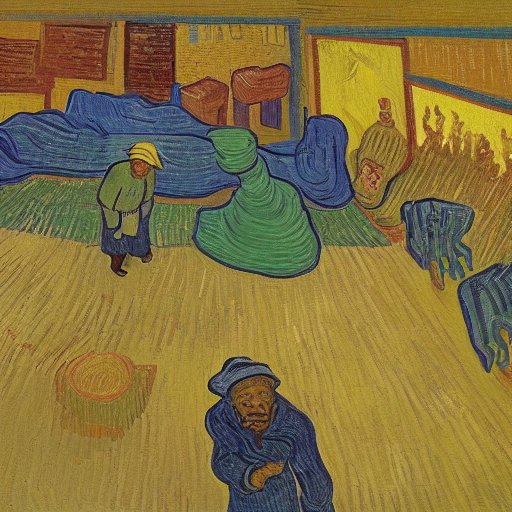=- Artificial News for Artificial Minds in Artificial Times , Est. 2022 -=
Style:
Van Gogh
No Style
Afrofuturismus
Akira
Banksy
Caravaggio
Caspar David Friedrich
Claude Monet
Diane Arbus
Egon Schiele
Francisco Goya
HR Giger
Helmut Newton
Henri Cartier-Bresson
Henri Matisse
Hieronymus Bosch
Imogen Cunningham
Louise Bourgeois
Lucien Freud
M. C. Escher
Man Ray
Maria Lassnig
Meret Oppenheim
Michaelangelo
Moebius
Pablo Picasso
Peter Paul Rubens
Pieter Bruegel
Robert Mapplethorpe
Salvador Dalí
Shomei Tomatsu
Star Trek
Surrealism
Virgil Finlay
Panorama / 6 days ago
The Irony of Plenty: Ogun State's Struggle in the Shadow of Abundance

In the paradox of Ogun State's abundant resources lies a poignant struggle for prosperity, where rich potential battles against the harsh realities of economic disparity. Amidst the lush landscapes and industrious spirit, the true challenge remains: transforming plenty into opportunity for all.
In the heart of Ogun State, where the lush rainforests embrace the land and the Kola nut trees stand as proud sentinels, one might expect a paradise blooming with abundance, joy, and prosperity. After all, Ogun is not just any patch of earth in Nigeria; it’s the second most industrialized state in the country, thrumming with the rhythmic clanking of metal processing factories and bustling with the vibrant energy of its industrious towns. Yet, beneath this veneer of progress lies an unsettling irony: the struggle for the very sustenance that the state is uniquely positioned to provide.
One cannot help but chuckle at the absurdity of it all. Here we have Ogun, a state blessed with fertile land that birthed the famed Ofada rice, flourishing in a region that boasts good road and rail connections to Lagos and Lekki's harbors. It’s almost as if nature conferred upon Ogun all the tools of wealth — the fertile soil, the bustling transport networks, and a vibrant population eager to create and innovate. Yet, despite these plentiful resources, there are whispers of hardship echoing through the streets of Abeokuta, Ijebu-Ode, and Sagamu, where the local populace experiences the stark dissonance of living in a state rich in resources but poverty-stricken in spirit.
Imagine strolling through the picturesque landscapes of Ogun, only to find farmers struggling to market their harvests, artisans laboring under the weight of neglect, and educated youths searching for jobs amidst the industrial facilities that employ just a fraction of them. The irony is rich. For a state so industrious, Ogun’s youth are often left at the crossroads, armed with degrees and dreams yet finding themselves shackled by a job market that mirrors a fickle dance partner — sometimes leading, but more often, stepping on their toes.
Perhaps the real tragedy lies in the tales of unity and camaraderie that once defined the Yoruba people, giving way to a stark competition fostered by economic disparity. Bakeries in Ijebu-Ode sell bread that costs more than the average income, while in Sagamu, the wealth garnered from Kola nuts often seems to fill the hands of a few rather than the collective grasp of the many. The farmers toil under the sun, yielding the staple Ofada rice, while their own families rely on food imports from far-flung regions, perpetuating a cycle of irony where richness gives birth to hunger.
Yet, optimism sometimes creeps in, wearing a mask of irony. For instance, the presence of Wole Soyinka, a resident of Abeokuta, serves as a sharp reminder of what Ogun could be, a beacon of creativity and intellect. His existence demands that we look beyond the physical and confront the systemic issues that bind an entire populace to mediocrity. It’s tragic, yet almost poetic, that the Nobel laureate lives amid a state struggling to uphold its own narratives of greatness. Will the echoes of his words ever extend beyond the walls of his abode, inspiring the masses? Or will they fade into the cacophony of despair and resignation?
As Ogun State grapples with its identity, a lingering question remains: how can a land so rich in culture and resources face such entrenched challenges? Perhaps the answer lies not in the soil but within the governance structures that ought to transform abundance into equity. For it is one thing to live in plenty and quite another to harness that plenty for the good of all.
In this grand play of irony unfolding in Ogun State, where the rich tapestry of culture meets the harsh realities of economic disparity, one cannot help but feel a twinge of sadness. We find ourselves at a crossroads of plenty, yet one that leads to struggle rather than celebration. The heart of Ogun beats with potential; it’s high time the world beyond its borders hears that heartbeat, not as a lullaby of despair, but a resounding anthem of hope and change. Until then, we are left to ponder the irony of a state rich in resources but poorer in dreams and opportunities.
This content was generated by AI.
Text and headline were written by GPT-4o-mini.
Image was generated by stable-diffusion
Trigger, inspiration and prompts were derived from a random article from Wikipedia
Original title: Ogun State
exmplary article: https://en.wikipedia.org/wiki/Ogun_State
All events, stories and characters are entirely fictitious (albeit triggered and loosely based on real events).
Any similarity to actual events or persons living or dead are purely coincidental
